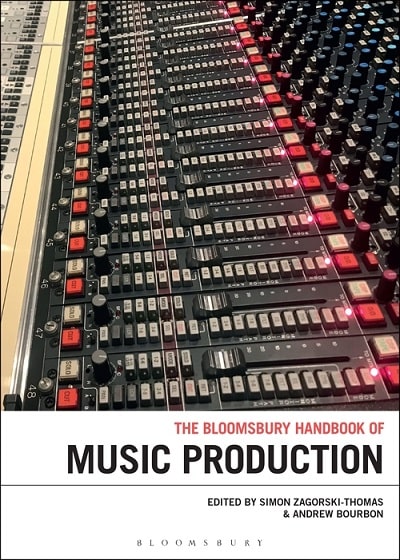
The Bloomsbury Handbook of Music Production PDF
The Bloomsbury Handbook of Music Production provides a detailed overview of current research on the production of mono and stereo recorded music. The handbook consists of 33 chapters, each written by leaders in the field of music production. Examining the technologies and places of music production as well the broad range of practices – organization, recording, desktop production, post-production and distribution – this edited collection looks at production as it has developed around the world. In addition, rather than isolating issues such as gender, race and sexuality in separate chapters, these points are threaded throughout the entire text.
Table of contents
Part I Background
1. Recorded Music (Simon Zagorski-Thomas, University of West London, UK)
2. Authenticity in Music Production (Mike Alleyne, Middle Tennessee State University, USA)
3. How to Study Record Production (Carlo Nardi, Free University of Bozen-Bolzano, Italy)
Part II Technology
4. From Tubes to Transistors: Developments in Recording Technology up to 1970 (Albin Zak III, University at Albany, USA)
5. Transitions: The History of Recording Technology from 1970 to the Present (Paul Théberge, Carleton University, Canada)
6. How Does Vintage Equipment Fit into a Modern Working Process? (Anthony Meynell, Record Producer and Independent Scholar, UK)
Part III Places
7. Recording Studios in the First Half of the Twentieth Century (Susan Schmidt-Horning, St. John’s University, USA)
8. Recording Studios since 1970 (Eliot Bates, The Graduate Center of the City University of New York, USA)
Part IV Organizing the Production Process
9. Information, (Inter)action and Collaboration in Record Production Environments (M. Nyssim Lefford, Luleå University of Technology, Sweden)
10. Creative Communities of Practice: Role Delineation in Record Production in Different Eras and across Different Genres and Production Settings (Tuomas Auvinen, University of Turku, Finland)
11. Pre-Production (Mike Howlett, The University of West London, UK)
Part V Creating Recorded Music
12. Songwriting in the Studio (Simon Barber, Birmingham City University, USA)
13. The Influence of Recording on Performance: Classical Perspectives (Amy Blier-Carruthers, Royal Academy of Music, UK)
14. Welcome to the Machine: Musicians, Technology and Industry (Alan Williams, University of Massachusetts Lowell, USA)
15. Studying Recording Techniques (Kirk McNally, University of Victoria, Canada, and Toby Seay, Drexel University, USA)
16. Materializing Identity in the Recording Studio (Alexa Woloshyn, Carnegie Mellon University, USA)
Part VI Creating Desktop Music
17. Desktop Production and Groove (Anne Danielsen, University of Oslo, Norway)
18. The Boom in the Box: Bass and Sub-Bass in Desktop Production (Robert Fink, University of California, Los Angeles, USA)
19. Maximum Sonic Impact: (Authenticity/Commerciality) Fidelity-Dualism in Contemporary Metal Music Production (Mark Mynett, University of Huddersfield, UK)
20. Desktop Production and Commerciality (Phil Harding, Joint Audio Media Education Service, UK)
21. Audio Processing (Mike Exarchos [aka Stereo Mike] and Simon Zagorski-Thomas, University of West London, UK)
Part VII Post-Production
22. Studying Mixing: Creating a Contemporary Apprenticeship (Andrew Bourbon. Huddersfield University, UK)
Part VIII Distribution
23. Producer Compensation in the Digital Age (Richard James Burgess, American Association of Independent Music, USA)
24. Evolving Technologies of Music Distribution: Consumer Music Formats – Past, Present and Future (Rob Toulson, Founder and Director of RT60 Ltd)
25. Listening to Recorded Sound (Mark Katz, University of North Carolina, Chapel Hill, USA)
26. Interpreting the Materials of a Transmedia Storyworld: Word-Music-Image in Steven Wilson’s Hand. Cannot. Erase. (2015) (Lori A. Burns, University of Ottawa, Cananda, and Laura McLaren, University of Toronto, Canada)
Index

